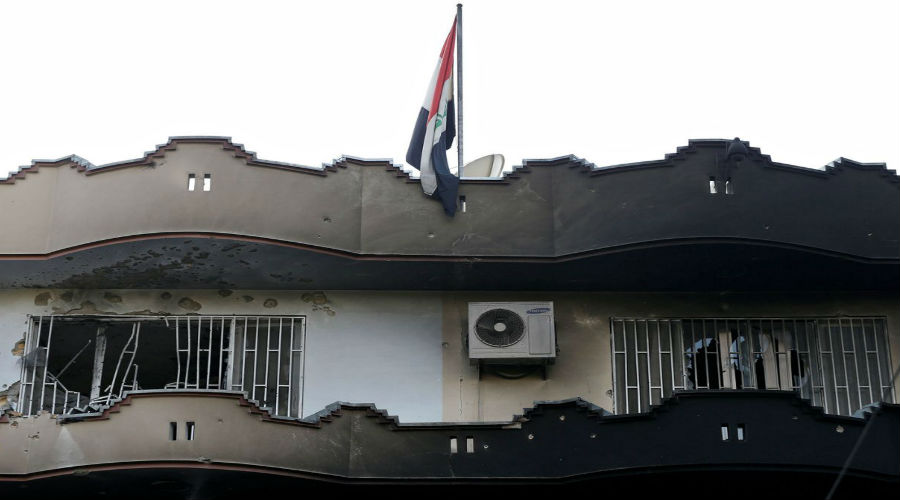ISIS appears to be planning to attack the interests of some states that are involved in the war against it. The terror group’s recent assault was conducted in retaliation for its defeat in Mosul, liberated on July 10, 2017. That is evidenced in ISIS’ quick claim of responsibility of the attack on the Iraqi Embassy in Kabul, Afghanistan on July 31, 2017.
This possibility is specially significant because ISIS has been recently keen on attacking foreign diplomatic missions in the heart of the Afghan capital to assert that it is still capable of carrying out terrorist activity, despite having received strong blows and suffering losses exacted on its forces in Afghanistan, including the killing of three of its commanders between 2016 and 2017.
Significant Timing
The attack on the Iraqi Embassy in Kabul coincided with a significant decline in ISIS’ activity not only in Iraq, but also in Syria. The US backed group of mostly Kurdish forces, the Syrian Democratic Forces (SDF), announced that it captured new areas south of Raqqa from ISIS militants. The SDF’s area of control within the city is estimated to have increased by 45 percent, which means that ISIS’ main stronghold is largely threatened. The development was possibly what prompted the terror group to attack the Iraqi Embassy in response to these defeats. The attack was an unprecedented move taken by the group, despite the fact that it carried out attacks on other Embassies in the Afghan capital.
Based on that, several reports linked the latest attack directly to that news conference held by the Iraqi Embassy on July 13 announcing the liberation of Mosul. During the conference, the Embassy emphasized the importance of eliminating the group not only in Iraq and Syria, but also in other countries, primarily Afghanistan, where the group seeks to expand its influence.
In other words, through the attack, the group sought to move its battle with the states involved in the anti-ISIS military campaign in Iraq and Syria to territory far from both states. In particular, ISIS sets its sights on states suffering from escalating security and political instability. Afghanistan has been ISIS’ current primary target.
Moreover, the recent attack on the Iraqi Embassy occurred after Abu Sayed, the head of ISIS-Khorasan (ISIS-K), the terror group’s Afghanistan affiliate, was killed in July 11 in a US strike against his headquarters in Kunar province. This indicates that the attack on the Embassy was the group’s direct response to that strong blow.
Multiple Indications
ISIS-K’s attack on the Iraqi Embassy in Afghanistan at this specific time has several indications, the most prominent of which can be summarized as follows:
1- Attacking High-Profile Targets: Over the past period, ISIS was keen on targeting diplomatic missions in multiple attacks. One example of such attacks is the May 30, 2017 bombing of the diplomatic district in Kabul that killed about 90 people and injured more than 400 others. However, the Iraqi Embassy was not the group’s particular target in that high-profile attack. Several reports indicated it the Embassy was attacked only because it is in close vicinity to the headquarters of Afghan security services, which has already been under tight security by special units of Afghan police formed by the interior ministry to protect buildings, not belonging to the Afghan government.
Nonetheless, the justification proved that it contradicts the reality on the ground, as ISIS operatives were able to pass through all security checkpoints erected in the area. It also premeditated the attack and tasked a suicide bomber and so-called inghimasi raiders to implement the plan. The first suicide blast allowed the other raiders to plunge into the embassy and attempt an attack on its employees before clashing with the Afghan police. Through this attack, ISIS sought to send across the message that it is still capable of carrying out high-profile attacks, despite its declining activity in its own areas of influences.
2- Ability to contain strikes: Through the attack on the Iraqi Embassy, carried out shortly after the killing of its head, ISIS’ Afghan offshoot seemed to have sought to emphasize that it is able to contain any repercussions. That is specifically after several views argued that the group could be disintegrated or at least weakened by attacking its third leader within a year. This view was expressed by US Secretary of Defense James Mattis while commenting on the death of Abu Sayed. “You kill a leader of one of these groups and it sets them back. It's obviously a victory on our side in terms of setting them back. It's the right direction,” Pentagon chief said on July 15, 2017.
3- Backing effective offshoots: ISIS-K is one of the terror group’s most active branches. There are views that Afghanistan is likely to become the alternative headquarters for ISIS’ leaders, after suffering a series of defeats in Iraq and Syria, and several international powers become more interested in drying up the group’s activities and sources of funding in the two countries. Hence, ISIS-K’s keen interest in carrying out the attack on the Iraqi Embassy to assert that it continues to be capable of carrying out more attacks in the coming period.
Nonetheless, it can possibly be concluded that the ISIS’ shift to attacking diplomatic missions could have sent across quite the opposite message. The message entails that the group is in reality seriously weak and is suffering a no easy decline, due to the ongoing series of severe blows in most areas to which it plans to expand influence.


